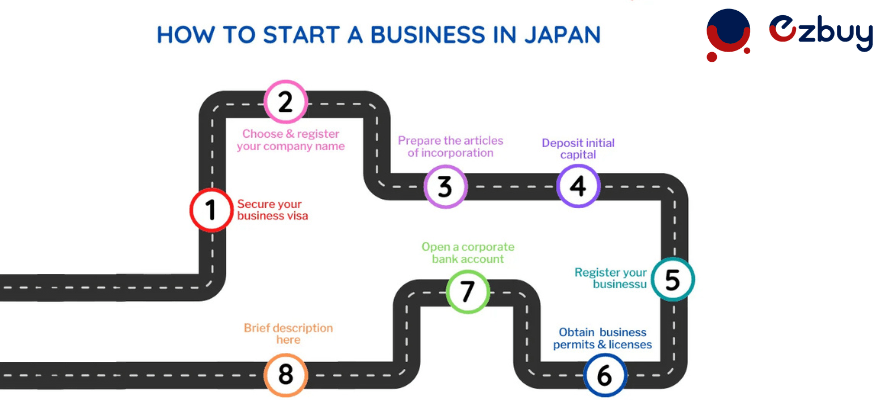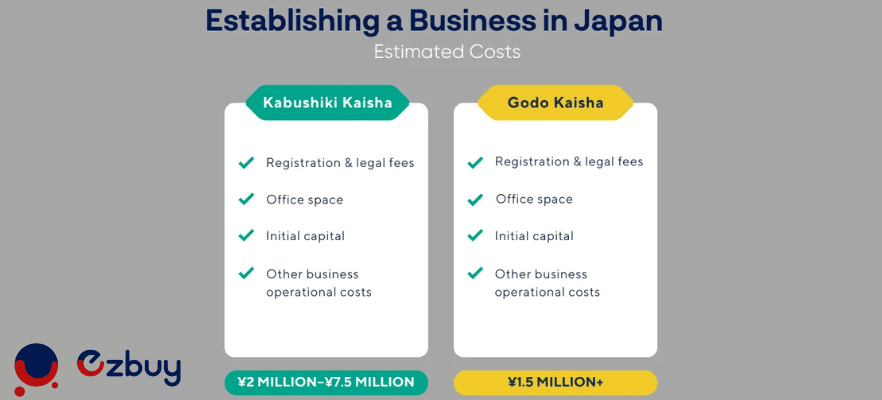How to Start a Business in Japan: A Comprehensive Beginner Guide
By Macy -26/05/2025 UTC.
Japan is one of the world’s most stable and lucrative markets. From cutting-edge technology to a booming eCommerce industry, the country offers incredible opportunities for entrepreneurs. But setting up a company here isn’t always easy, especially for foreigners. The process of company establishment in Japan can be complex, with strict legal requirements, language barriers, and bureaucratic hurdles.
Worry not, we’re here to simplify the process for you.
In this guide, we’ll walk you through:
- Why Japan is an attractive market for foreign entrepreneurs
- The different types of Japanese business structures
- A step-by-step breakdown of company establishment in Japan
- Costs, legal requirements, and compliance steps
- A smart alternative to starting a business in Japan as a foreigner
Without further ado, let’s dive right into it!
1. Why Start a Business in Japan?
Japan is a powerhouse economy with a thriving business ecosystem. Whether you're a startup founder, an eCommerce seller, or a global brand looking to expand, Japan offers exciting opportunities.
But before you dive into company establishment in Japan, let’s explore why Japan is an attractive market—and the challenges you might face as a foreign entrepreneur.
1.1. The appeal of Japan’s business environment
Japan offers more than just market size—it provides stability, strong consumer demand, and government support for foreign entrepreneurs. Here are the details of why it’s a great place to establish a company.

- Strong economy & high purchasing power
Japan has the third-largest economy in the world, with a GDP exceeding $4 trillion. Consumers here prioritize quality over price and are willing to pay a premium for trusted brands, innovative products, and excellent service. This makes Japan an ideal market for businesses that focus on premium, high-value offerings.
- Business-friendly government initiatives
The Japanese government actively encourages foreign investment and entrepreneurship through agencies like JETRO (Japan External Trade Organization). Startups in Japan can access grants, tax incentives, and business support programs to ease their market entry. Additionally, startup visas are available to help international founders launch businesses without immediate permanent residency.
- Stable market with low risk
Adding to that, Japan’s business environment is one of the most stable and predictable in the world. Unlike emerging markets, where economic fluctuations can pose risks, Japan provides long-term security for investors and entrepreneurs. This stability makes it easier to plan for sustainable growth and expansion.
- Booming eCommerce & digital economy
Last but not least, Japan has one of the largest and most sophisticated eCommerce markets in the world. Platforms like Rakuten, Yahoo! Shopping, and Amazon Japan drive billions in annual sales. More importantly, cross-border eCommerce is rapidly growing, allowing foreign businesses to sell to Japanese consumers without opening a physical store.
1.2. Challenges of the Japan company registry for foreign entrepreneurs
While there are incredible opportunities, opening a business in Japan isn’t without its challenges. If you’re a foreign entrepreneur, here’s what you should prepare for:
- Complex registration process
Japan has a highly structured and bureaucratic business registration system. The process requires notarized documents, a physical office space, and several legal approvals—all in Japanese. If you don’t have local business experience, the paperwork alone can feel overwhelming.
- Strict legal & compliance requirements
Every company in Japan must follow strict tax laws, employment regulations, and financial reporting standards. Non-compliance can lead to penalties or business restrictions.

- High initial setup costs
Starting a business in Japan requires a significant financial commitment. The costs for notarization, legal fees, office rental, and initial employee salaries can add up quickly. Unlike some countries that allow businesses to launch with minimal capital, Japan often requires a substantial investment upfront.
- Banking & financial barriers
Opening a corporate bank account is an essential step in the process of company establishment in Japan, yet it can be difficult for foreign entrepreneurs. Most banks require a resident visa, a local guarantor, and proof of active business operations before approving an account. This can slow down the process of handling transactions, paying employees, and securing funding.
1.3. Is there an easier way?
If you want to test the water before committing to full company establishment in Japan, there’s a smarter alternative: cross-border eCommerce.
Instead of going through the complex setup process, foreign sellers can sell in Japan through platforms like Ezbuy, which provides a ready-made infrastructure for logistics, payments, and customer service. This approach allows businesses to start selling in Japan immediately without registering a local entity.
We’ll dive deeper into this alternative later—jump to Selling in Japan Without Registering a Company to explore how Ezbuy can help you get started hassle-free!
2. Understanding Business Structures in Japan
One of the biggest challenges in registering a company in Japan—the complex registration process—stems from the various business structures available.
For many, differentiating these options is the first big hurdle. Which type of company best suits my Japanese business? What legal requirements do I need to meet? How can I minimize costs while maximizing growth potential?
Let’s break down the main types of business entities in Japan and help you find the best fit—especially if you’re an eCommerce entrepreneur looking for a hassle-free way to enter the market.
2.1. Types of Japanese legal entities
Japan offers several business structures for foreign entrepreneurs, each with different legal, financial, and operational implications. Choosing the right one depends on your business goals, budget, and long-term plans.

Kabushiki Kaisha (KK)
A Kabushiki Kaisha (KK) is Japan’s most recognized and respected business structure, similar to a joint-stock company. It’s ideal for long-term business operations and businesses looking to raise capital or build credibility in Japan.
Key considerations:
- Requires articles of incorporation, directors, and a registered office.
- Offers limited liability protection to shareholders.
- Allows for business expansion and stock issuance.
- Preferred by large corporations and enterprises.
- Involves higher setup costs and strict corporate governance rules.
Godo Kaisha (GK)
A Godo Kaisha (GK), on the other hand, is Japan’s version of a limited liability company (LLC). It’s a simpler, more flexible alternative to the KK, making it ideal for startups and small-to-medium-sized businesses (SMBs).
Key considerations:
- Requires fewer formalities and lower initial costs than a KK.
- Allows owners (members) to have direct control over business decisions.
- Offers limited liability protection, just like a KK.
- Works well for solo entrepreneurs and privately held businesses.
- Has less prestige than a KK, which can impact credibility with Japanese clients.
Branch Office
A branch office allows a foreign company to operate in Japan without creating a separate legal entity. The office remains under the parent company's control but must comply with Japanese business regulations.
Key considerations:
- Requires business registration with the Legal Affairs Bureau.
- Must appoint a representative in Japan (who can be a foreign national).
- Profits are taxed as part of the foreign company’s income.
- Suitable for established businesses expanding into Japan.
Representative Office
A representative office is not a legal business entity but allows foreign businesses to conduct market research, promotional activities, and liaison work in Japan. It cannot engage in direct sales or sign contracts.
Key considerations:
- No need for formal company registration.
- Cannot conduct commercial activities or generate revenue.
- Used by businesses testing the market before full entry.
2.2. Choosing the right business structure for eCommerce entrepreneurs
If you’re planning to run an eCommerce or cross-border business, your legal structure matters. Here’s what to consider:
- Best for full-scale eCommerce brands: KK or GK
A KK offers high credibility, while a GK provides more flexibility with lower setup costs.
- Best for international businesses testing the market: Branch Office
A branch office allows you to establish a presence in Japan without the Japan business registration.
>>> Read more: Top Startups in Japan and Comprehensive Guide for Success 2025
3. Company Establishment in Japan: The Step-by-Step Process
Now that you understand the different Japanese business structures, it’s time to dive into the actual process of company establishment in Japan. Setting up a business in Japan involves multiple legal steps, paperwork, and compliance requirements.
To make things easier, we’ve broken it down into eight clear steps to help you navigate the process efficiently and with confidence.

Step 1: Secure your business visa
If you're a foreign entrepreneur planning to live in Japan, you’ll need a Business Manager Visa to operate legally. Without it, you can own shares in a Japanese company but cannot actively manage it.
Here are some key visa options:
- Business Manager visa (最長5年): Ideal for company owners and executives. It requires an office in Japan, at least ¥5 million in capital or two full-time employees, and a well-structured business plan that proves financial sustainability.
- Startup visa (1 year): Available in certain cities to support entrepreneurs. It’s less strict than the Business Manager visa but still requires a solid business plan.
- Self-sponsorship visa: An alternative if you work as a freelancer but want to establish a business presence.
Whatever visa options you’re aiming for, the application process is generally the same:
- Prepare your business plan (must be in Japanese).
- Secure an office address before applying.
- Submit your visa application to the Immigration Bureau.
- Receive approval (can take 2-3 months).
Step 2: Choose & register your company name
Next, it’s time to pick your company name and then register it at the Legal Affairs Bureau (法務局) in your chosen business location. Keep in mind that the name you choose for your company in Japan must be unique and legally compliant.
Before registering, you need to:
- Check name availability: Use the Japan Patent Office to ensure your name isn’t trademarked.
- Follow naming rules: Avoid restricted words (e.g., "Bank" or "Insurance" without approval).
- Choose a Japanese or English name: Both are acceptable, but Japanese names build local trust.
Step 3: Prepare the articles of incorporation
The Articles of Incorporation (Teikan / 定款) define your company’s structure, purpose, and rules. This document must be notarized and submitted before registration, especially if you’re establishing a KK. In case you opt for GK, notarization is not required.
Here’s what to include in the Articles of Incorporation:
- Company name and purpose
- Business address
- Capital investment details
- Director and shareholder information
- Company rules and decision-making processes.
Pro tip: Consider hiring a Japanese judicial scrivener (Shiho-shoshi / 司法書士) to ensure everything is properly prepared.
Step 4: Deposit initial capital
Congratulations, you’ve gone halfway through the process of company establishment in Japan! Once your Articles of Incorporation are finalized, you must deposit your initial capital into a Japanese bank account. Based on the business type you choose earlier, the capital requirements vary greatly:
- For KK: No official minimum, but ¥1+ million (~$7,000+) is recommended for credibility.
- For GK: Can start with ¥1 million, but higher capital contributes a lot in bank and visa approvals.
- Adding to that, if you’re about to apply for the Business Manager Visa, you have to deposit at least ¥5 million.
Once you’ve determined the capital amount you need to deposit, follow the process below:
- First, open a temporary personal bank account under the name of the business owner.
- Next, deposit the required capital.
- Then, keep a bank statement as proof. This statement will be submitted during your Japan business registration.
Pro tip: Opening a bank account as a foreigner without a residency visa can be daunting. If that’s the case, you can opt for cross-border payment solutions or partner with a local representative to bypass the issue.
Step 5: Register your business with the Legal Affairs Bureau
Once your Articles of Incorporation are ready and the capital is deposited, you can officially register your company.
Follows is the list of required documents:
- Articles of Incorporation (notarized if required)
- Capital deposit proof (bank statement)
- Company name approval
- Company seal registration (Hanko/Inkan)
- List of directors & shareholders
- Application forms from the Legal Affairs Bureau
Based on your chosen business type, the processing time and registration fees might differ greatly:
- For KK, it might take 2-4 weeks to process and about ¥150,000 of registration fees.
- The processing time for GK is rather shorter (only 1-2 weeks). You also need to pay only about ¥60,000.
Step 6: Obtain essential business permits & licenses
At this stage, you may need industry-specific permits depending on your business type. For instance:
- Retail & eCommerce: Online business registration with METI (Ministry of Economy, Trade, and Industry) or Sales permit for second-hand goods.
- Food & Beverage: Health and safety permits from local authorities
- Import/Export: Trade licenses from METI, and an Import license from Japan Customs.
Pro tip: If you’re not sure what permits you need, consult with a legal advisor or JETRO (Japan External Trade Organization). Or else, opt for cross-border eCommerce platforms like Ezbuy, and they will handle compliance, shipping, and local tax issues for you.
Step 7: Open a corporate bank account
Once you’ve completed the process of company establishment in Japan, you can open a corporate bank account under your company name for transactions.
That said, Japanese banks have strict policies for foreign business owners, such as:
- Corporate Registration Number
- Company seal (Hanko)
- Proof of office address in Japan
- Resident visa or a local business partner
- Proof of business operations (business plan and financial projections).
On top of that, some banks require at least six months of operating history before approving foreign-owned accounts. In that case, you should consider fintech alternatives like Payoneer or Wise for initial transactions.
Step 8: Register for taxes & social security
Congratulations, your company establishment in Japan has almost completed! This is the final step: Once your company is operational, you’ll have to register with tax authorities and enroll in social insurance programs.
Here are the mandatory tax registrations:
- Corporate Tax (法人税): Register with the National Tax Agency, paid annually, usually around 23,2%.
- Consumption Tax (VAT, 消費税): 10% sales tax for businesses earning ¥10+ million in revenue in two years.
- Withholding Tax (源泉徴収税)/: If you hire employees, you must withhold their taxes.
- Payroll & Social Insurance: Enroll employment insurance if you have staff, and pay health insurance & pension for full-time employees.
Pro tip: Consider working with a Japanese accountant to stay compliant with tax laws and avoid penalties & business restrictions.
4. Estimated Costs of Establishing a Business in Japan
We’ve just covered the step-by-step process of company establishment in Japan, but some are still wondering: How much does it cost to start a business in Japan?
The truth is, starting a business in Japan isn’t cheap—especially when compared to some other countries that allow minimal capital investment. From registration fees to office space and professional services, costs can quickly add up.

To help you budget properly, let’s break down the estimated costs of setting up a company in Japan.
4.1. Registration fees & legal costs
To officially register your business in Japan, you’ll need to pay government fees and cover legal expenses such as document notarization. Here’s an overview:
On top of that, if you’re not fluent in Japanese, you may need a judicial scrivener (Shiho-shoshi / 司法書士) to assist with the paperwork, which can cost an additional ¥50,000–¥100,000 (~$350–$700).
4.2. Office space requirements
To be eligible for Japan company registration, you’ll need a physical office address. This means renting a commercial space or using a virtual office.
Please be noted that if you plan to apply for a Business Manager visa, a virtual office won’t be accepted—you’ll need a physical space with a lease agreement.
4.3. Initial capital investment
As previously mentioned, while there’s no official minimum capital requirement for a KK or GK, having a realistic initial capital improves your chances of business success (and visa approval). Banks and business partners prefer companies with higher capital, as it signals financial stability and credibility
4.4. Other setup & operational costs
Beyond registration and office space, there are additional startup costs to consider when starting a business in Japan as a foreigner:
(*): Since Japan requires prepaid corporate tax for the first year, even if your business isn’t profitable yet, you’ll need to pay at least ¥70,000 in taxes.
Taking all these factors into account, here’s a rough estimate of the total initial investment required for company establishment in Japan:
Is there a more cost-effective way?
Instead of going through the full company establishment process, foreign entrepreneurs can enter the Japanese market immediately by leveraging cross-border eCommerce solutions like Ezbuy Japan.
With Ezbuy Japan, you can:
- Start selling in Japan without a registered company
- Avoid high initial costs and legal hurdles
- Use a pre-built infrastructure for payments, logistics, and customer service
Contact us today for detailed guidelines!
5. Selling in Japan Without Registering a Company: A Smart Alternative
By now, it’s clear that establishing a company in Japan is a big investment—both in terms of time and money. From high registration fees to strict legal requirements, the process of company establishment in Japan can be overwhelming for foreign entrepreneurs, even for the experienced.
But what if you could start selling in Japan immediately—without incorporating a business?
For many foreign entrepreneurs, especially eCommerce sellers, a full business setup may not be necessary right away. Instead of going through the complex registration process, there’s a cost-effective way to enter the Japanese market: leveraging cross-border eCommerce solutions.
5.1. How cross-border selling works?
Instead of setting up a company, you can sell your products directly to Japanese customers through cross-border eCommerce platforms that handle the operational side for you.
Here's how it works:
- List your products on Japan’s top marketplaces (e.g., Rakuten, Yahoo! Shopping, Amazon Japan).
- Use third-party fulfillment services to store, pack, and ship orders from international warehouses.
- Accept payments in multiple currencies without opening a Japanese bank account.
- Let the platform manage customer service & returns, eliminating the need for a local office.
5.2. Why Ezbuy Japan is the best solution for cross-border sellers?

If you’re looking for a trusted platform to help you sell in Japan without the burden of business registration, Ezbuy Japan offers an all-in-one solution!
Here’s what makes Ezbuy Japan stand out:
- No need for a Japan-registered company, bank account, or office.
- Ezbuy handles shipping, warehousing, and last-mile delivery in Japan.
- Get paid easily, no local banking needed.
- Customer support in Japanese, ensure smooth communication with local buyers.
- Test your product demand before making a long-term commitment.
With Ezbuy Japan, you can start selling in Japan right away—without worrying about company formation, tax compliance, or complex logistics.
5.3. What’s the best approach for you?
If you're still deciding between registering a business or using a cross-border eCommerce model, consider these key factors:
If you're still unsure, the safest strategy is to start with cross-border eCommerce to test the market. Once your sales grow, you can decide whether to set up a legal entity.
>>> Read more: How to Successfully Sell in Japan - A Detailed Guide
6. Final Words
Company establishment in Japan is a big step, but it doesn’t have to be overwhelming. Whether you’re building a long-term business or testing the market, understanding the process is key to success. While full company registration offers control and credibility, cross-border eCommerce is a smart alternative for those looking for a faster, low-risk entry.
Whichever path you choose, having the right support makes all the difference. Ezbuy Japan helps businesses expand effortlessly—handling logistics, payments, and local operations so you can focus on growth. Explore your options today and start selling in Japan with confidence.